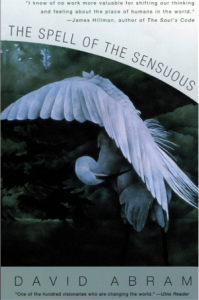Over the weekend I attended a conference on religion, ethics, and nature at Ohio Northern University, where one of the keynote speakers was David Abram. A dozen years ago Abram wrote a book that for me worked magic. It became a beacon making clear what I needed  to do next: I would begin writing about nature spirituality, about the mind that permeates the world and everything we see.
to do next: I would begin writing about nature spirituality, about the mind that permeates the world and everything we see.
The book was The Spell of the Sensuous, and in it Abram explores in vivid, evocative words how the human mind is connected to the vivid, sensuous world around us–how it is in fact part of this world, not–as we usually think of it–separate from the physical world of trees, rocks, and rivers, salamander, opossum, and bear. The human mind and senses alike open into a world of relationship–into a lively and aware world of others who shape our knowing.
Humans are tuned for relationship. The eyes, the skin, the tongue, ears, and nostrils–all are gates where our body receives the nourishment of otherness. This landscape of shadowed voices, these feathered bodies and antlers and tumbling streams–these breathing shapes are our family, the beings with whom we are engaged, with whom we struggle and suffer and celebrate. . . . The simple premise of this book is that we are human only in contact, and conviviality, with what is not human.
Abram’s keynote too wove a poetic spell in which we accompanied him on a weeks-long camping trip in the Rockies. We sat on boulders watching the play of eddies in a stream; we glimpsed an antler slipping between lodgepole pines, only to have it vanish, like thoughts slipping away before we perceive their full contours. We heard the buzzing fly darting again and again toward our faces, like the vexing thought that won’t go away no matter how many times we swipe at it but also won’t stay still long enough to truly see it.
Next time you’re vexed by a fly–I’ve done this many times–try this: search your mind and find the buzzing thought. Then focus on the air in front of your face. The fly will be darting here and there, buzzing around and around. See if you can locate the fly. At the moment of visual contact, offer that vexing thought to the fly. The next thing you know, the fly is zooming away.
There is a relationship, in other words, between what is inside us and what is outside us. The human mind is not separate from the rest of the natural world–an idea that in Western history can be traced to the Sephardic Jewish philosopher Spinoza. (For his outrageous thinking, Abram added, Spinoza was excommunicated from his synagogue in Amsterdam in 1656 and cursed from the faith.)
We exist in mind, said Abram. It does not dwell in us; we dwell in it.
The relationship between mind and landscape is more than metaphorical. There is a forgotten intimacy between thought and earth. What if mind is not ours but rather earth’s?
After the presentation, when the audience had exhaled its collective breath, one man asked, “I notice you focused just on the things in the world around us. Why not talk about space and planets and the wonders there too?” Abram responded,
Because it seems easy for us to focus out there, on what is far away, and forget about the world immediately available to our senses, our body, our perception. Our huge blind spot is THIS world.
By coincidence–or not–my sweetie, who was traveling with me for the weekend but not attending the conference, found in the home where he was staying an antique bookmark bearing a quote from Shakespeare (As You Like It, act 2, scene 1). The Duke, who has been exiled from court life, is living in the forest and finding it much more literate than he expected:
And this our life, exempt from public haunt,
Finds tongues in trees, books in the running brooks,
Sermons in stones, and good in everything.
Thank you for the beautiful writing on this blog. Your quotes from Abram remind me of another Jewish philosopher, Martin Buber, who I happened to be writing about yesterday and who said ‘All real living is meeting.’
Ah, yes, delighted to have Buber brought into this conversation. I’m convinced that the solution to our ecological crisis is as simple–and intricate–as relating to nature in “I-Thou” rather than “I-It” terms. Thanks, Kathleen.
Thanks for sharing these relevant and profound thoughts. I have, for too long, felt isolated in the landscape between science and spirituality, which is why I am focusing on the traditions of planting sacred trees in Norway and Sweden. I feel that I have to seek these ideas in other cultures in order to confirm my own sense of the profound.
Thanks for Caring!
Doug
Yes, it’s sad but true that companionship with and reverence for nature are not mainstays of American culture. And yet many, many people would like them to be. Now we just have to figure out how to get everybody involved in turning our society’s tide in that direction.